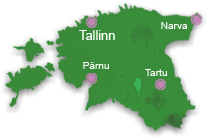| Companies | Tourist Attractions & Sightseeing | Map Search |
Emmanuel Wille, Chef de Cuisine of Olde Hansa Restaurant, Knows His Way Around the Medieval Cuisine24.August 2015
Chef de Cuisine of the Olde Hansa Restaurant, a Belgian Emmanuel Wille, found himself in Tallinn 20 years ago after accidentally coming across a job advertisement in a local paper. Eventually, he stayed there for good. He married a Russian girl, learned Estonian, and uses English to communicate with his family. He works at the most famous restaurant situated in the Old Town of Tallinn and considers Estonia as his second homeland. What brought you to Estonia? My passion for traveling. When I was younger, I used to work for a period of time and thereafter took a break to go and see the world. In 1995, I returned to Belgium from Indonesia. I did not have a job at the time. I did not have much money. Then I saw an ad in a local paper saying that Roosikrantsi, a Belgian cuisine restaurant in Tallinn, was looking for a Chef de Cuisine. It got me interested. After getting in touch with them, I bought a ticket and flew out to Estonia. At first, I did not think I would stay there for long since I really did not go there for the money. I was expected to work four hours a day. The restaurant provided me with a place to live, food, and small income. My primary objective was to update the menu, put together a good team, and try to get the staff more motivated . When I started, the kitchen had 14 cooks. Coming to work I noticed that they were all somewhat strung up, as if worried about something. Thus, one day I told them, “Just take it easy, guys, and you’ll be fine!” One of the cooks became my wife afterwards and we have two children. Estonia has long been like a second home to me. It will be 20 years this year since I settled here. To be frank, the quality of the cuisine at Roosikrantsi was quite decent even before I arrived there. All I did was add a few extra touches. I worked on taste components, the texture of dishes as well as their visual appearance. I mingled with our clients. I always wanted the distance from the kitchen to the customer’s table to be as short as possible and this approach paid off. The number of visitors started increasing. Very soon I knew our clients by their first names. I even helped one to arrange a wedding and another to have a birthday party. Then a Russian millionaire invited me to work at the Charital restaurant in Pirita, which he had bought in 2000. The previous Manager of the place was also from Belgium but had decided to return home. It was a matter of prestige for the owner to have his own restaurant, as this was where he usually welcomed his foreign partners. In 2007, the owner sold the restaurant for as much as four times what he had initially paid for it. It had become just business. Many thought we were going bankrupt but that was not the case since at the time of the sale the restaurant was making profit. Fortunately for the owner, the deal was made also before the crisis started, when many places in Tallinn had to close down. I was shocked by the sale of the Charital restaurant. After all, for seven years I had put my heart and soul into it. One day all that was just gone. For a period of time I stayed at home, I was trying to cope with it. Then I got a job offer from Dimitri Demjanov, the owner of Gloria which is a famous restaurant in Tallinn. Whilst working there, I was also participating in other exciting projects.
For instance, I got a chance to train Estonian cooks for the Bocuse d'Or contest which is one of the world’s most prestigious culinary tournaments. The first time I went to Lyon with Vladislav Djatshuk, the Chef de Cuisine of the Tchaikovsky restaurant, and this summer we went there with Dmitri Haljukov, the Chef de Cuisine of Cru. Neither of them won, however even just taking part in a contest as big as this is both highly prestigious as well as a testimony to the high level of the Estonian cooks. After all, Lyon attracts the absolute top masters of the culinary art from all over the globe. Keeping them company, spending time with them, and watching them cook is a fantastic opportunity for any cook. I truly hope that one day the main prize goes to an Estonian cook.
You’ve been working at the Medieval Restaurant Olde Hansa for about 5 years. What is your primary professional objective over there?
What is the phenomenon of Olde Hansa ?
How do you come up with your Medieval recipes?
I do not. Honestly. I just like to cook nice, delicious food. A Michelin star is not just about rating your dishes. You will never get a star just because your food is great. Stars are awarded based on many criteria: service, cleanliness, the quality of food, etc. It is very hard to get a rating like that and it is even harder to constantly maintain a Michelin star level. It is way too stressful for Head Chefs. When you have one star, you will not sleep for a day; when you have got two of them, you will not sleep for two days; and when you have been awarded with three stars, then you will have to stay up seven days a week. That is why many cooks die young. Just recently a cook passed away in Denmark at the age of 35. Besides, stress is often the source why one may turn to liquor to relieve stress. And, yet again, that is additional load on the body. My health is what I care about the most and therefore I am determined to lead a healthy lifestyle. For example, I go track running: in winter I use the winter track and in summer I do it outdoors.
Tell us about your family.
Do you yourself often go to restaurants?
|




)
